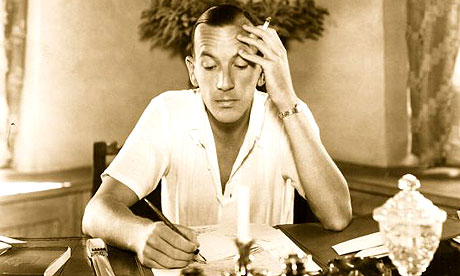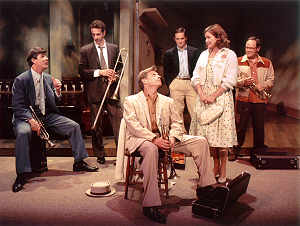If you’ve looked in the right-hand column lately, you know that I enjoyed reading The Play That Changed My Life: America’s Foremost Playwrights on the Plays That Influenced Them, a book that I wholeheartedly commend to your attention.
 Noboby asked me, but the play that changed my life was Noël Coward’s Blithe Spirit, which I saw for the first time in 1968, performed by the drama club of my small-town high school. Not only was it my first viewing of Blithe Spirit, but it was the first play I’d ever seen in a theater. Alas, I can’t tell you anything in particular about the actors or the staging–I was just a boy–but I do remember that I was carried away, not just by Coward’s wit but by the improbable and arresting spectacle of a proscenium stage set filled with real people pretending to be fictional characters.
Noboby asked me, but the play that changed my life was Noël Coward’s Blithe Spirit, which I saw for the first time in 1968, performed by the drama club of my small-town high school. Not only was it my first viewing of Blithe Spirit, but it was the first play I’d ever seen in a theater. Alas, I can’t tell you anything in particular about the actors or the staging–I was just a boy–but I do remember that I was carried away, not just by Coward’s wit but by the improbable and arresting spectacle of a proscenium stage set filled with real people pretending to be fictional characters.
Twelve months later I trod the same boards, playing Miles in The Innocents, and for several years after that I spent a fair amount of my spare time watching, acting in, and helping to produce plays of one kind or another. I was far too self-conscious to be a good actor, but at least I had the sense to know my limitations, and I was more than content to be involved, however peripherally, in the magical craft of live theater.
My theatrical “career” came to an end–or so I thought–when I graduated from college in 1979. While my love of theater remained strong and serious, it changed shape, and for the next couple of decades I was mainly interested in lyric theater: opera, musical comedy, ballet and modern dance. Not until 1999, when I began writing a monthly column for the Washington Post about the arts in New York, did I go to more than a handful of carefully chosen straight plays a year.
 The first such play that I wrote about in the Post was Warren Leight’s Side Man, the subject of my second column. It made a tremendous impression on me, in part because it portrayed a world that I knew well, that of the working jazz musician. I was hooked all over again, and thereafter I saw as many Broadway and off-Broadway shows as I could shoehorn into my crowded schedule.
The first such play that I wrote about in the Post was Warren Leight’s Side Man, the subject of my second column. It made a tremendous impression on me, in part because it portrayed a world that I knew well, that of the working jazz musician. I was hooked all over again, and thereafter I saw as many Broadway and off-Broadway shows as I could shoehorn into my crowded schedule.
In 2003 I became the drama critic of The Wall Street Journal, and since then I’ve reviewed well over seven hundred shows, most of the best of which were straight plays and some of which I will remember for as long as I live. I Am My Own Wife, Intimate Apparel, Private Fears in Public Places, Orson’s Shadow, Doubt, The Coast of Utopia, The Seafarer, The Four of Us, The Starry Messenger, David Cromer’s revivals of The Glass Menagerie and Our Town, a letter-perfect Trip to Bountiful that I saw with Horton Foote sitting directly behind me…the list goes on and on. But none of them has changed my life in the way that Blithe Spirit did. Had I not seen it at the tender age of twelve, I doubt very much that I would have gone on to become a drama critic, much less write the libretto for Paul Moravec’s The Letter. Few events in my life to date have cast so long or consequential a shadow.
